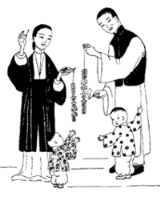
Qingming Festival
Overview
Traditional Chinese holidays
The traditional Chinese holidays are an essential part of Chinese culture. Many holidays are associated with Chinese mythology and folklore tales, but more realistically, they probably originated from ancient farmer rituals for celebrating harvests or prayer offerings...
on the 104th day after the winter solstice (or the 15th day from the Spring Equinox
Equinox
An equinox occurs twice a year, when the tilt of the Earth's axis is inclined neither away from nor towards the Sun, the center of the Sun being in the same plane as the Earth's equator...
), usually occurring around April 5 of the Gregorian calendar
Gregorian calendar
The Gregorian calendar, also known as the Western calendar, or Christian calendar, is the internationally accepted civil calendar. It was introduced by Pope Gregory XIII, after whom the calendar was named, by a decree signed on 24 February 1582, a papal bull known by its opening words Inter...
(see Chinese calendar
Chinese calendar
The Chinese calendar is a lunisolar calendar, incorporating elements of a lunar calendar with those of a solar calendar. It is not exclusive to China, but followed by many other Asian cultures as well...
). Astronomically it is also a solar term
Solar term
A solar term is any of 24 points in traditional East Asian lunisolar calendars that matches a particular astronomical event or signifies some natural phenomenon. The points are spaced 15° apart along the ecliptic and are used by lunisolar calendars to stay synchronized with the seasons. Solar terms...
(See Qingming
Qingming
Traditional East Asian lunisolar calendars divide a year into 24 solar terms . Qīngmíng or Chīngmíng or Seimei is the 5th solar term. It begins when the Sun reaches the celestial longitude of 15° and ends when it reaches the longitude of 30°...
). The Qingming festival falls on the first day of the fifth solar term, named Qingming.
Unanswered Questions

